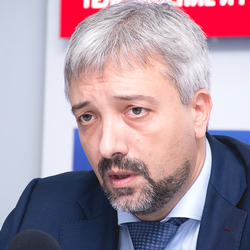On the trail of Saratov tragedy: will death penalty protect children from maniacs?
How Saratov reacted to Liza Kiselyova’s death and what deputies and human rights activists think about the abolition of the moratorium on the death penalty in Russia
A number of deputies of the State Duma claimed the necessity to go back to the death penalty. The abolition of the moratorium on this type of punishment could protect children from maniacs, parliamentarians think, this is who they reacted to the 9-year-old girl’s murder in Saratov. However, not all their colleagues support them considering chemical castration enough for criminals. Human rights activists are urging not to forget about numerous innocent people who were sentenced because of miscarriage of justice. Realnoe Vremya found out how the wave of public outcry broke out.
The suspect has six previous convictions
9-year-old Liza Kiselyova went to school on 9 October and didn’t go back. All Saratov Oblast looked for her for more than a day: not only police but also Liza Alert team joined the search. Hundreds of volunteers combed every square. People who participated in the search said they everyone helped, including sellers from corner shop: they offered people coffee and tea, let them in to use WC and warm themselves.
As Saratov newspapers write, it turned out that Liza’s body was founded on 10 October in the daytime, while Mikhail Tuvatin who was suspected of her murder was detained in the evening. 112 Telegram channel informs that the suspect has six previous convictions for thefts, assault and rape. A video of his interrogation appeared on the website of the Investigative Committee on 11 October where he says he seized an abandoned garage without permission a couple of months earlier. Tuvatin says that Liza was passing by and asked if it was his garage. He was scared, dragged the child in and strangled her. Now investigative authorities are finding out if the girl was raped. Rehearsing investigative actions on 10 October, the police didn’t inform the volunteers that they didn’t have to look for the girl any more immediately. This is why everyone knew official information only at night, by 00.30.
Unrest in Saratov: “People were in shock. Nobody was looking for a corpse”
Advocate Ksenia Polezhayeva who participated in the search of Liza and witness the night events in Saratov told Realnoe Vremya how it was:
“People have been looking for the girl for more than a day, emotions were running high. And everyone believed that they would find Liza alive, nobody was looking for a corpse. And when people went outside the main office and warned they would be announcing information, everyone who was waiting to be assigned squares were full of hope. People exhaled with relief, though I clearly understood what exactly we would be said. Then a representative of Liza Alert team and said the girl had been found.
Somebody from the crowd shouted right away that the girl was dead and the suspect was detained. Another person said that the body had been found in a garage, and everyone just rushed in that direction: at least 300 people gathered there. It was when the investigative actions with the suspect were taking place. We heard shouts: ‘There he is, there he is!’ There were some aggressive people, but the majority of the crows was numb with shock. When the car tried to drive away, sticks were thrown to it, they tried to impede the police. Young fathers were the most emotional people. At one moment, the crowd shouted that the police gassed. I can’t confirm this information, but a young man who was walking next to had smarting eyes, as he said.”
The city was up all night, people spontaneously gathered next to police stations and offices of the Ministry of Internal Affairs. Moscow Street was blocked by cars, only one lane for trolleybus was left. People required to bring “the one who is responsible for everything”. The head of the Kirov District Department of Internal Affairs where Tuvatin was allegedly brought, met with the crowd at night and answered all their questions in detail. He tried to explain what police was doing on the scene. Ksenia Polezhayeva says explanations were really needed:

Tatarstan remembers Vasilisa Galitsyna’s murder
A tragic story of 8-year-old Vasilisa Galitsyna from Naberezhnye Chelny roiled Russia in February 2013: Farukh Tashbayev, a citizen of Uzbekistan, was detained in connection with rape and murder. Vasilisa had been looked for three days. Residents of one the villages where a girl was seen in his car helped to arrest Tashvayev: she had a bruise over her eye, and in answer to the question why she had a bruise, the man said Vasilisa had had a scuffle at school.
Tashbayev was found by photofit, during investigative actions he acknowledged the murder of the child and showed the place he hid the body in.
All Tatarstan, all Russia was in shock then. Tashbayev received a life sentence in a high-security penal colony, but many said then that the death penalty should go back in Russia for crimes against children. Even head of the Russian Ministry of Internal Affairs Vladimir Kolokoltsev was among the “many”: he claimed on 10 February 2013 that “as an ordinary citizen” he didn't see “anything reprehensible” in the return of the death penalty for such criminals.
The moratorium on the death penalty has been in force since 1997 in accordance with the Convention for the Protection of Human Rights and Fundamental Freedoms. The last death penalty in Russia was given in 1996.
Death for death: should moratorium on death penalty be cancelled for killing children?
Citizens of Saratov created a petition on the abolition of the moratorium on the death penalty. At the moment of publication, it already had over 26,000 signatures. People’s emotions are understandable. Advocate Ksenia Polezhayeva told us:
“As a mother and human, I want the moratorium on the death penalty to be abolished in such cases. But we aren’t ready for it: either you as citizens or I as an advocate, the investigation. Plus, Russia is going to have serious problems on the international stage. For me, it sounds like utopia, I don’t imagine how to abolish the moratorium in these articles technically.
And the public outcry is understandable: people are afraid, and it is fine. A young man who was standing next to me said: ‘I am scared, I have a 2-year-old daughter, and who is vouching that this will not happen to her tomorrow? I am ready to do something with him because I fear for my daughter.’
Officials are also urging to abolish the moratorium.

His colleague Olga Alimova agrees with him: “Unless punishment becomes inevitable in the country, this will go back to our cities and villages. If the death penalty punished paedophiles, murderers, abusers, terrorists, grief wouldn’t come over to us”.
Children’s Ombudswoman in Saratov Oblast Tatiana Zagorodnyaya-Onischenko shares this point of view: “Everyone is asking me what punishment paedophiles-murderers should receive. The maximum. The death penalty is probably too fast. The maximum punishment when the criminal will suffer. Not mock everyone around him but suffer”.
Ayrat Farrakhov: “Perhaps chemical castration must be introduced”

“Emotionally, I am on the side of those who are for the return of the death penalty. It is an awful tragedy, and I perfectly understand them. But let’s think about how to protect our children from such tragedies in the future, not how to punish this person. I have questions: how could a person with recidivism get a chance to commit such a crime? How did he turn out to be out of supervision, held the girl’s hand and led her somewhere? There is a lot of questions about this situation. And having punished the person and made a decision on the death penalty, we won’t solve the issue, we won’t prevent tragedies in the future. This is why it seems to me that we should look at his story better and analyse how it could happen. If we return the death penalty, it won’t be a systemic solution.
Today everyone is overcome with emotion, there are two camps discussing if we should punish such criminals or not. But I am anyway offering to think about what should be done to prevent such tragedies. Today a list of laws must be adopted on how these people must be supervised. They probably need to be treated mentally, perhaps chemical castration must be introduced, separate strict supervision. Maybe there is sense in publishing their photos. In other words, we must adopt other laws that warn, not punish.”
Igor Sholokhov: “How many cases did we have when innocent people were sentenced?”

“These talks haven’t stopped since the moratorium was announced. The people is always for the death penalty, in all the countries. And only humanistic origins of state institutions impede from turning into a primitive society and starting to shoot and hang people. How many cases did we have when innocent people were sentenced? The people considered they should be sentenced. But only the court can determine the guilt of a person. The suspect was almost killed in Saratov on 10 October, and if there had been lynching, they would also have been held accountable for the murder by law, without aggravating circumstances. This is why every person should think that if he conducts a vendetta, he is going to face legal punishment. One should go by humanistic principles in everything, not to plunge the country into the Middle Ages.
P.S. The administration of Saratov Oblast took care of all the arrangements of Liza Kiselyova’s funeral.
The World Day Against the Death Penalty was celebrated on 10 October.